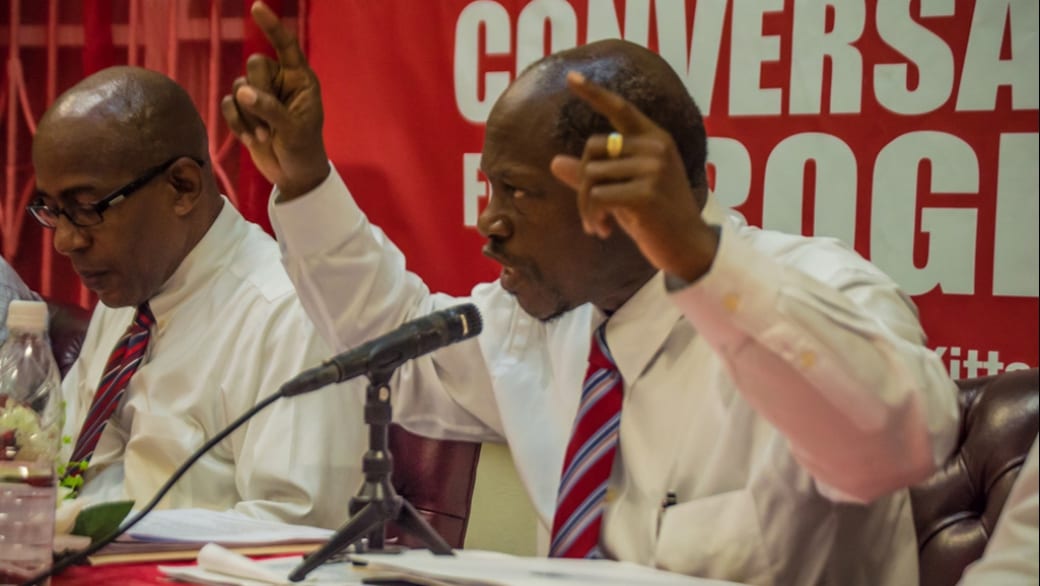In January 2011, a representative of St Kitts and Nevis told the UN Human Rights Council that LGBT people enjoy the same rights as everyone else in their country.
“There are no instances of denial of job opportunities or any attacks on any individuals of that disposition,” said the delegate.
And it’s true that St Kitts and Nevis, the country that Canada intends to deport gay asylum seeker Rolston Ryan back to, appears to be moving in the right direction when it comes to LGBT rights.
As with most former British colonies in the Caribbean, the island federation retains anti-sodomy laws that carry lengthy prison terms. But like most of its neighbouring countries, the state rarely, if ever, actually enforces these laws.
In June of this year, Kittitian police officers took part in four days of LGBT sensitivity training led by Canadian-Jamaican lawyer and gay-rights activist Maurice Tomlinson.
Denzil Douglas, who was prime minister from 1995 to 2015 and has long been the country’s dominant political figure, has in the past called for reviews of anti-sodomy laws and for greater tolerance towards LGBT people.
But anecdotal evidence from St Kitts and Nevis paints a different picture — that this is a place where homophobic violence is still a regular occurrence.
Take former prime minister Douglas. His statements about gay rights have been quoted extensively in the foreign press, by human rights agencies, and even by Canada’s Refugee Appeal Division in its judgment against Ryan.
However, Douglas has also been caught on camera making homophobic statements about his political opponent, current St Kitts and Nevis Prime Minister Timothy Harris.
At a Labour Party rally in April 2013, Douglas went on a bizarre homophobic rant, calling Harris a “little girl” and a “hog,” joking that Harris had begged Douglas to “breed” him.
People at the rally can be heard screaming “batty man hog.”
It should also be noted that Douglas has in the past boasted that “I can incite,” a reference to a violent demonstration in 1993 led by his supporters.
Douglas, despite giving pro-LGBT comments to international audiences (and occasionally local ones), did nothing to remove anti-sodomy laws while he was in office.
Discrimination by St Kitts and Nevis officials has even occurred against tourists, which are the life-blood of the country’s economy.
In 2009, two gay tourists on a cruise ship said that they were accosted by the Port Authority while docked in St Kitts. They claimed to have been detained and subjected to homophobic taunts. In 2005, a gay nudist cruise wasn’t allowed to dock in Nevis.
But most disturbing was the shooting of 16-year-old Shakeem “Hotness” Walters. In 2012, Walters, who was openly gay, was severely beaten and shot in the head.
A suspect was arrested and convicted of the attack, but that is little succour to Walters, who is now permanently paralyzed from the waist down and blind.
Comments on news articles about Walters include a mix of support and violent threats.
“Batty Man Fi Dead; It’s unfortunate but you reap what you sow. I am surprised he lasted this long. We can’t have these fags and gays running rampant around our neighbourhoods and on our island without repercussions. Spreading diseases and breaking up families. I hope this proves to be lesson to those who are like him,” reads one.
Another states: “Batty Man Fi Dead; This nastiness here. It was bound to happen to it any ways. Have you ever heard of Sodom and Ghomorro [sic]???? Look at him in the pic looking like a woman. I hope more of them get gunned down too!!”
Akeem, a gay man who says he’s a friend of Walters, tells Daily Xtra via online message that he has also been subjected to homophobic violence in St Kitts. He says that in 2011, he was staying with a friend’s family until their home was burned down.
He says that the police took a report and gave him a printout describing what he’d lost in the fire, but never followed up beyond that.
Akeem believes that Ryan wasn’t subject to the worst homophobic violence when he was living in St Kitts because he wasn’t open about his sexuality. He also thinks that Ryan was luckier than most because he had a place to stay, unlike Akeem, who has been on his own since he was 16.
A report submitted in November 2015 to the UN Human Rights Council by pro-LGBT groups states that “acts of violence committed against person because of their sexual orientation or gender identity continued to occur, and persons who defended the rights of these individuals were often subjected to verbal attacks.”
The US State Department has echoed this, warning that “unofficial reports of violence and discrimination remain a problem” for LGBT people in the area and that “anecdotal evidence suggested that LGBT persons were reluctant to report incidents of violence or abuse out of fear of retribution or reprisal due to their sexual orientation.”
And, of course, Daily Xtra has now spoken to three individuals that have said they were victims of homophobic violence that they reported to the police.
Despite all of this, the government of St Kitts and Nevis maintains that they have no reports of anti-LGBT violence.
Can a country protect its gay citizens if homosexuality is illegal, gay bashings go ignored and prominent political figures make homophobic comments?
According to the Canadian government, the answer is yes.

 Why you can trust Xtra
Why you can trust Xtra


